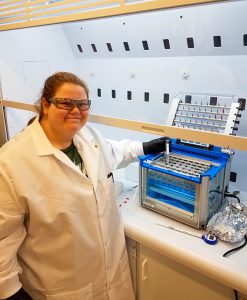
APHL Fellow Lexi Duncan in the WSLH PFAS Research Lab.
Lexi Duncan joined the WSLH PFAS research laboratory in February 2021 as one of four inaugural Association of Public Health Laboratories (APHL) Environmental Health Laboratory Fellows.
According to APHL, the Environmental Health Laboratory Fellowship program “trains and prepares scientists for public health and environmental laboratory careers and supports human exposure projects through targeted environmental or biomonitoring surveillance. Its mission is to provide a high-quality training experience for the fellow, and expand public health laboratory workforce capacity.”
Lexi’s work at the WSLH began with gaining both lab and field experience in sampling and testing for PFAS compounds in multiple matrices. She is also working on bringing up a method to analyze these same samples for total organic fluorine (TOF) using combustion ion chromatography to provide a general measure for total PFAS.
In addition to her lab work, Lexi is also gaining valuable experience in the outreach and policy realm by developing talking points for partner agencies and other scientists “… on how TOF can be used to advance regulatory and science goals.”
Lexi and her fellowship mentor Martin Shafer are featured in the winter edition of APHL’s Lab Matters magazine.
Here’s a Q&A with Lexi on her fellowship and her experiences here at the WSLH.
When did you start your APHL fellowship and how long will it last?
My Fellowship started on February 21, 2021, and I have extended my Fellowship to end in November of 2023.
What appealed to you about the APHL fellowship program? About the WSLH?
The APHL fellowship program allowed me to gain experience and connections within the Laboratory community, and I wanted the chance to impact public health positively. I chose WSLH because my mentor, Martin Shafer, was very passionate about how PFAS negatively affects the environment and the population. I knew with the amount of passion Martin had for his field, he would be a great person to learn from. I also did my research before selecting my laboratory, and WSLH is one of the best labs in the nation.
What has been your favorite part of the Fellowship so far?
My Favorite part of my Fellowship has been participating in fieldwork. I enjoyed collecting and following a sample through the complete sample processing steps. I have also enjoyed working with different state and government organizations, such as the Department of Natural Resources (DNR) and the Environmental Protection Agency (EPA), during PFAS Research Center’s projects.
How will the Fellowship help you in your career plans?
My Fellowship has helped my career plans by allowing me to gain hands-on experience and network with significant people in the lab community. Before accepting this Fellowship, I never saw myself working in a laboratory, but now I know the lab is where I am meant to be.
